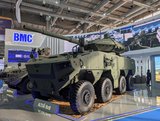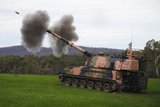Pakistan conducts test launch of Fatah-ll guided rocket system
Fatah II’s development programme began in 2021 as a way for Pakistan to use conventional warheads in its military operations. (Photo: US DoD)
The Pakistan Armed Forces has successfully carried out a test firing of the Fatah-II, an indigenously made Guided Multi-barrel Launched Rocket System (GMLRS).
The army’s Inter-Services Public Relations (ISPR) wing claimed that the new weapon could precisely strike targets at a distance of 250km to 400km. The service added that the weapon had been fitted with modern ‘avionics, sophisticated navigation system and unique flight trajectory’.
The claimed range would be a big jump compared to Fatah-I which can only reach a distance of 140km.
Fatah II’s weapons development programme began in 2021 as a way for Pakistan to use conventional warheads in its military operations. The GMLRS weapon system could allow the Pakistan Army to carry out precision target-deep strikes.
Pakistan’s efforts to develop a high-precision rocket system come amid increasing tensions with neighbouring India in the Kashmir region. Recent arms developed in the country include the Ghaznavi, a surface-to-surface missile test-launched to ensure Army Strategic Forces Command’s operational readiness.
The ballistic missile, with an operational range of up to 300km, was tested just a day after India began its trials of a cruise missile off the coast of Odisha’s Balasore district.
ISPR noted that these successes were part of Pakistan’s broader strategy to strengthen regional deterrence and enhance strategic stability.
More from Land Warfare
-
![World Defense Show 2026: Large vehicles and counter-drone systems take the limelight]()
World Defense Show 2026: Large vehicles and counter-drone systems take the limelight
Visitors who attended the first World Defense Show four years ago continue to speak of the difficulties they faced with poor facilities and power problems. This year’s event emphasised its status as one of the major defence expositions and as a place where regional players and those less welcome at other shows could take centre stage.
-
![MKJ Warrior Series — The Nett Warrior Qualified Connector for Today’s Soldier Systems]()
MKJ Warrior Series — The Nett Warrior Qualified Connector for Today’s Soldier Systems
ITT Cannon’s MKJ Warrior connectors are designed for the harshest environments, delivering mission critical comms, navigation and USB data/power.
-
![Active vehicle protection comes to the forefront as Trophy and Iron Fist secure contracts]()
Active vehicle protection comes to the forefront as Trophy and Iron Fist secure contracts
Experience on the battlefield is accelerating the adoption of active protection systems as technologies continue to evolve to reflect shifting global defence needs.
-
![World Defense Show 2026: Hanwha increases Middle East presence and reveals Tigon 6x6 sale]()
World Defense Show 2026: Hanwha increases Middle East presence and reveals Tigon 6x6 sale
Shephard sat down with Hanwha Middle East and Africa president Sung Il at World Defense Show 2026 to hear about the company’s plans for the region and how it plans to use local industry success to win deals.






















